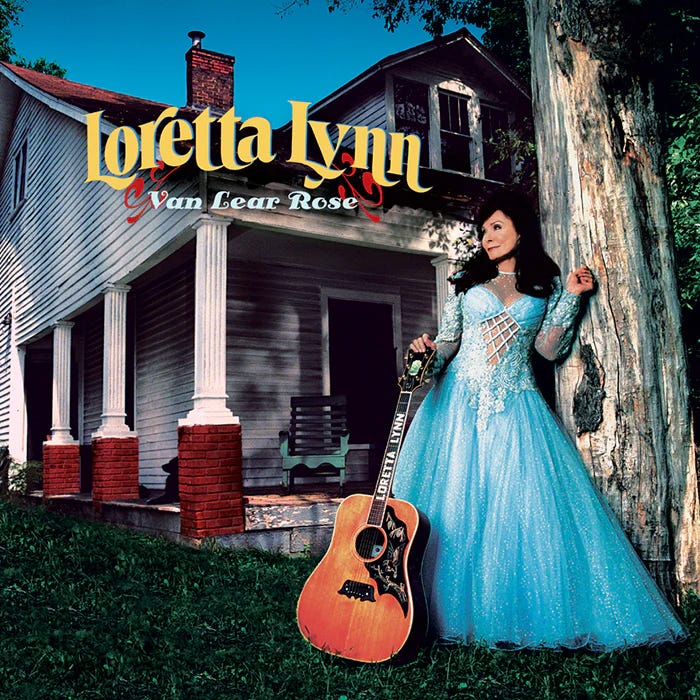Loretta Lynn - Van Lear Rose
Van Lear Rose is a very personal album. Though it has the requisite themes in country music, it is also an inspired musical journal of home, family, faith, loss and the loneliness that follows.
Perhaps I am a cynical bastard, but at least I am an honest one. It has not escaped my notice that Loretta Lynn’s new record, Van Lear Rose is receiving heaps of praise from other critics that are pleased to hear collaboration between the coal miner’s offspring and Jack White, a critical darling of the alternative crowd. The promotional copy of the CD that I received was conspicuously plastered with a yellow label stating it had been awarded five stars from another magazine. Would I render myself a human cliché if I too raved about this effort? Would I have to give the record six stars to avoid enduring the psychological trauma of star envy?
Van Lear Rose is a very personal album. Though it has the requisite themes in country music such as love and infidelity, it is also an inspired musical journal of home, family, faith, loss and the loneliness that follows. In the liner notes of the CD, Lynn says, “This is the first time I wrote all of the songs on a record” and after nearly five decades as a singer, it is well that she trusted her considerable talents. No one else could have imparted the story of her life as well as she has, with insight, self-effacing wit and the wisdom of someone who has known great love as well as abject poverty and phenomenal success.
The title track is the story of Loretta’s father; a roughneck Johnson County coal miner that managed to steal the heart of the small town beauty. This lyrically vivid example of storytelling also packs a musical wallop without any polished Nashville veneer, yet powerful in its simplicity. "Portland Oregon," a duet with White has one of the best psychedelic guitar intros that I have ever heard, lasting nearly a minute and forty seconds. What follows is a masterfully executed track with a pickup truckload of musical dynamics and an ideal union of White’s alternative sensibility and Lynn’s down home insight.
Several tracks on the disc address the subject of cheating but none better than "Family Tree." The timeless lyrical topic of the scorned wife confronting the other woman is also a quintessential model of traditional country music, with outstanding fiddle playing by Dirk Powell, well complimented by Dave Feeny’s pedal steel work. The simplicity of Lynn’s lyrics almost make her job look easy, yet there is real quality in her ability to convey a story—particularly one you know that she experienced first hand.
The most beautiful track on the record is "Miss Being Mrs," a movingly sincere tribute to Lynn’s late husband Doo, who passed away in 1996. Her performance needs nothing more than the acoustic guitar that perfectly supports her finely crafted tale of profound bereavement and aching loneliness. This is the essence of talented songwriting, as it is experiential without a hint of pretension.
At sixty-eight years of age, Loretta Lynn is in no danger of losing her relevance. This record is as ageless as it is innovative. The production is lean, yet superb and there is nothing on it that is frivolous or ill placed. For the players that contributed to this work, the reverence for the traditional country genre is not admired from a safe distance but is fully realized in its purest American spirit. I care not what other writers are saying about this record; but just in case one of them attempts to one up me, I am printing my own yellow sticker with ten stars on it.
(Interscope Records)


